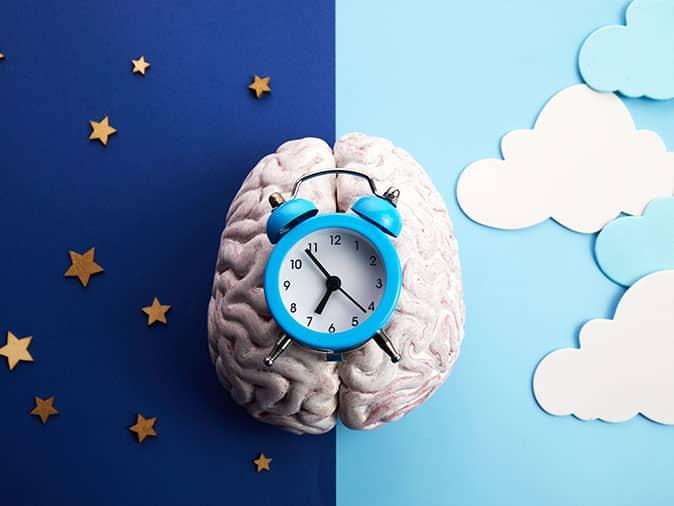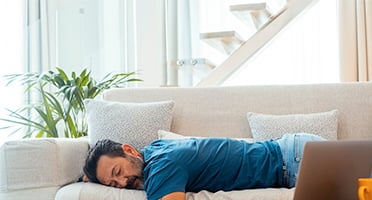Your body performs many complicated processes to keep you alive and healthy throughout the day and night. Each system has a different purpose that has evolved over thousands of years to ensure the survival of our species. One such process is sleeping. The more we find out about it, the more we realize that it’s not just our brains that need sleep. It’s our entire body. And even when we think we’re sleeping fine, we may inadvertently be triggering a body response that prevents us from getting the restful sleep we need to be truly healthy. In a 2022 study, researchers found that sleeping with even a tiny amount of light can have health consequences.

Interruptions to Your Circadian Rhythm Affect Your Health
Your circadian rhythm is an internal process that regulates your cycle of being awake and asleep. It repeats every twenty-four hours, ensuring that you get the sleep you need. However, recent research has shown that even a minor disruption can cause adverse effects on your metabolism.
In a small study of only 20 people, Dr. Phyllis Zee, director of the Center for Circadian and Sleep Medicine at Northwestern University, monitored sleepers in two groups. For the first night, each group slept in a dark room. The next night, one group was exposed to 100 lux of artificial light. This is just enough light to see in the dark but not enough to read. Dr. Zee performed tests on the participants while they slept. She monitored their heart rates and brainwaves and took blood tests every few hours. When the participants woke, they were each given sugar and had their body’s responses recorded. In the morning, those who slept in the lighted room had elevated heart rates throughout the night and insulin resistance (blood sugar failed to return to normal levels).
Participants Reported Feeling Well Rested
When asked how they slept, the participants in the lighted room reported that they were well-rested despite the differences in their heart rates and blood sugar failing to spike. After further scrutiny of other measurements, researchers discovered that even a small amount of light put the body’s automatic nervous system into an alert state, explaining their collected data. Even if your eyes are closed, your body has evolved to know what’s happening around you. When there is light, our body’s systems don’t get the rest they need.
The Effects on Your Body are Widespread
After prolonged exposure to light when sleeping, you could develop chronic illnesses such as diabetes and insulin resistance. Other research has even found that sleeping with a light or TV increases the risk of gaining weight by 17%—11 pounds over five years!
Today, many people opt to fall asleep with the TV on or fall asleep as they scroll through their social media feeds. This research, along with more extensive studies, shows that exposure to light while sleeping is detrimental to your health.
Practice Good Sleep Hygiene for Your Best Health
To achieve optimal health and function, work on cleaning up your sleep hygiene. According to the CDC, these sleep habits promote good sleep.
- Go to bed and wake up at the same time every day.
- Your bedroom should be quiet, dark, relaxing, and at a comfortable temperature.
- Remove electronic devices from the bedroom. This includes phones, laptops, and TVs.
- Don’t eat large meals or drink caffeine or alcohol before bed.
- Get enough exercise during the day.
Sleep Apnea Affects Your Circadian Rhythm
Are you following the guidelines for good sleep and still waking up feeling unrested and fatigued? There could be another explanation. Sleep apnea is a sleep breathing disorder where you experience pauses in breathing throughout the night. You may not notice it, but your brain senses the lack of oxygen and wakes you briefly so you can resume breathing.
Each time you wake, you disrupt your sleep. This is detrimental on its own, but sleep deprivation from sleep apnea affects your circadian rhythm, too. The study by Dr. Zee shows that these disruptions will affect your metabolism and can lead to chronic illnesses.
The consequences of untreated sleep apnea are many, and still, 80% of people with the disorder go undiagnosed or underdiagnosed. It can lead to cardiovascular problems such as stroke and heart failure, neurological issues like depression and Alzheimer’s, cancer, weight gain, and many other health detriments.
Do You Have Sleep Apnea?
The only way to know if you have sleep apnea is by performing a sleep test. SleepTest.com makes it easy by providing home sleep studies and connecting you with a sleep expert in your area that can help you get the treatment you need. Take a look at sleep apnea symptoms and take this short online sleep quiz if you’re unsure.
Your home sleep study is easy. We’ll send it right to your house, and you will take it over the course of two nights. It’s simple and comfortable to wear with clear instructions. A home sleep test is just as effective as a lab study, and you can take it from the comfort of your own bed, where discomfort won’t disrupt your sleep.
If you think you might have sleep apnea, order your home sleep study today and connect with a doctor who can help.

Feeling tired all the time, even after a full night’s sleep? You might be suffering from sleep apnea. Discover how an at-home sleep test can help diagnose the root cause of your fatigue—and get you back to feeling like yourself.

Spring is here—and so is the pollen. For the millions dealing with seasonal allergies, the symptoms can be more than just annoying. And if you also have sleep apnea, those stuffy nights and restless sleep can get even worse.
Let’s take a closer look at how spring allergies and sleep apnea affect each other—and what steps you can take to sleep more comfortably.




